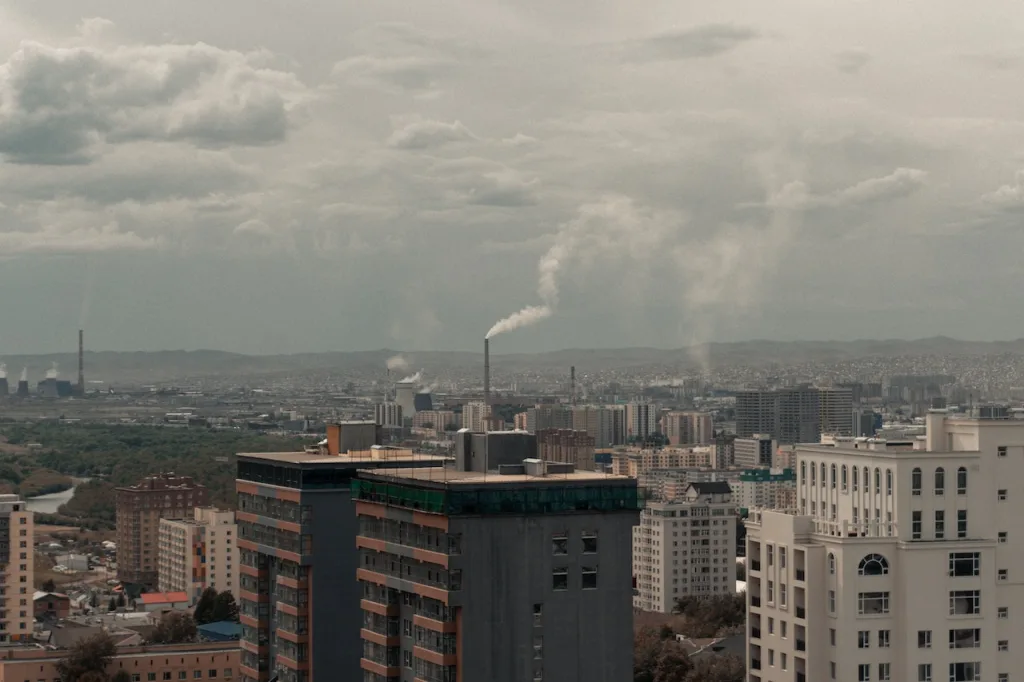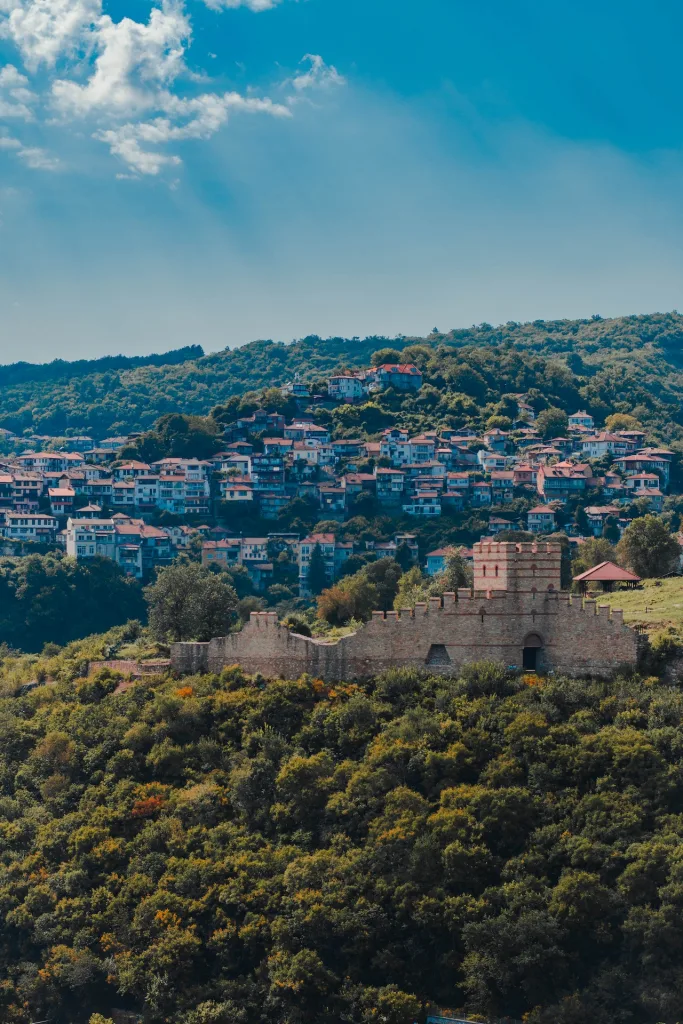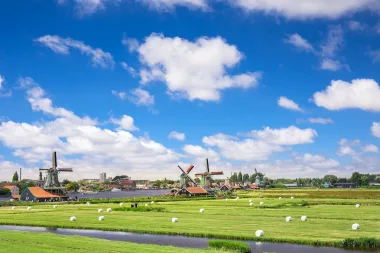Last Updated on July 31, 2023 by Ecologica Life
As you stroll down the beautiful, yellow cobblestone streets of Sofia, Bulgaria’s charming capital, an unsettling veil dims the morning sunshine.
This isn’t an early morning mist or an unusual weather pattern, but rather a persistent, suffocating smog.
Why does Bulgaria, a nation steeped in rich history and blessed with natural beauty, grapple with such a severe smog problem? More so, does this relate to the country’s intriguing population decline.
This article aims to unravel these threads. We will explore the causes of the smog, some interesting demographic trends, and possible solutions to Bulgaria’s problems.
Table of Contents
The Smog Issue in Bulgaria

Bulgaria Air Quality Statistics
In 2019, Bulgaria was ranked as the 24th most polluted country in the world, and one of the dirtiest in Europe.
Sofia, the capital city, frequently exceeded the World Health Organisation’s (WHO) recommended levels for particulate matter (PM10 and PM2.5). These are fine particles of dust and soot caused by the burning of fossil fuels, such as coal.
The economic cost of air pollution
Comparisons with Other Countries in Europe and Around the World
It should be noted that air pollution is a major health concern for most Europeans, not only in Bulgaria. In 2021, 97% of urban dwellers in the European Union were exposed to high levels of particulate matter. These levels exceeded the health guideline set by the World Health Organisation.
In the EU, around 275,000 people die prematurely each year because of fine particulate matter. Additionally, around 64,000 people die each year due to nitrogen dioxide (NO2).
According to iqair.com, in 2022 Bulgaria was the 55th most polluted country out of 131 countries. It had an average AQI of 64 (moderate) and PM2.5 concentration 3.7 times the WHO annual air quality guideline value. This suggests that while Bulgaria’s air quality has improved since 2019, there is still plenty of room for improvement.
Europe’s zero Pollution Plan: In Progress
The Health Effects of Smog
Exposure to outdoor air pollution is associated with a wide range of acute and chronic health effects. These can range from irritation of the lungs to death.
The effects on respiratory and cardiovascular disease are well documented. However, emerging science also demonstrates that air pollution is a risk factor for children’s health and even diabetes.
Sensitive and vulnerable groups such as pregnant women, children, the elderly and those with respiratory disease are particularly affected. Individuals from low-income groups are also notably affected.
Causes of Smog
The main sources of pollution in Bulgaria are domestic heating with solid fuels such as coal and wood, coal combustion for electricity and heat production in thermal power plants, road traffic, industrial construction, and repair services.
The distribution of the different sources of polluted air varies from region to region. For example, towns near coal power plants have more sulphur dioxide (SO2) than those farther from industrial areas.
Bulgaria’s Energy Mix
Bulgaria has generally always used coal as 15-20% of it’s energy supply. Coal use has been decreasing since 2016. In 2020, nuclear energy surpassed coal as an energy source for the first time in the country’s history.
Problems with Environmental Regulation and Enforcement
One of the secondary causes of smog in Bulgaria is the country’s problems with environmental regulation and enforcement.
Bulgaria has been notoriously known for its non-compliance with EU standards. The country has frequently been warned and even fined by the European Commission for non-compliance with EU environmental standards. These legal actions often related to the levels of air and water pollution as well as waste management practices.
Bulgaria’s non-compliance isn’t entirely its own fault. Bulgaria has also struggled to enforce existing environmental regulations. Factors contributing to this include limited resources and corruption.
Finally, the Bulgarian population appears to be less environmentally aware than other European countries. Low public participation in environmental decision-making and limited awareness of these issues make for a less compliant population in general.
Bulgaria’s Declining Population
Bulgaria has been described as the world’s ‘fastest shrinking economy‘. Over the past few decades, the population of Bulgaria has been steadily declining.
According to The World Bank, in 2021 Bulgaria’s population was 6.88 million. This was a loss of 6% of its population compared to 2011 (7.35 million). Data suggests that as of 2023 it’s population has shrank to 6.73 million.
Bulgaria’s population peaked around 1988 at 8.98 million. Since then it has been losing around 10% of its population per decade. Bulgaria also suffered from a relatively high mortality rate during COVID-19, which has contributed to population decline.
Two key reasons for Bulgaria’s population decline are low birth rates and mass emigration. The current fertility rate is 1.56 births per woman (in 2020). In developed countries, having around 2.1 children per woman is considered the ideal number for population replacement. This means that each couple should have at least 2 children or more.
Most young Bulgarians leave the country for better job opportunities in other European countries, leaving behind an ageing population. Although there are initiatives such as Tuk Tam, which aims to bring skilled Bulgarians back to their country.
Is the Smog Linked to Population Decline?
It appears Bulgaria’s job market and low birth rates are causing population decline, but there could be other factors at play also.
According to the EU, Bulgaria ranks among the countries with the highest number of pollution-related deaths. It also has a significant number of years of life lost due to air pollution. Moreover, a large proportion of its urban population is exposed to microparticles.
If you live in one of the most polluted cities in Europe, and you have the opportunity to live somewhere nicer and earn more why wouldn’t you?
This also affects family planning, as young parents want to give their children better opportunities and a safe place to live. Of course, not all of Bulgaria is as polluted as the capital Sofia, but 76.4% of Bulgaria’s population live in cities. Given the choice, young Bulgarian professionals and parents often choose the nicer urban environments of their European neighbours.
Exploring Solutions

Bulgaria has made some progress in recent years. Years of life lost due to PM2.5 and NO2 air pollution fell significantly between the years 2016-2020.
In 2022, the share of zero-emission vehicles in new registration was 3.1% and is steadily increasing. Bulgaria aims to cover 27% of its energy consumption with renewable energy by 2030. This will significantly reduce its greenhouse gas emissions. It will have to take big steps to achieve this.
As Bulgaria invests in going green, it will consequently create more jobs for skilled workers. More electric cars will reduce smog and make cities like Sofia beautiful again. The green transition alone won’t stop Bulgaria’s population decline, but it’s a step in the right direction.








